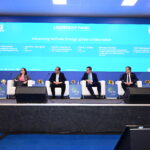Climate Action Front and Center: COP Rejects Cop-outs

Unprecedented global Climate challenge demands urgent emission cuts and puts renewables at the forefront
COP 28, which starts in Dubai on 30 November and lasts for two weeks, will put the nation’s determination to the test more than any recent United Nations Framework Convention on Climate Change (UNFCCC) meeting.
This year’s global temperatures have surpassed all previous records, and 2023 appears to be the warmest year yet. According to the IPCC, emissions must decrease by 43 per cent this decade to keep global warming within the 1.5 degree Celsius threshold set by the Paris Agreement’s member nations. However, there isn’t much proof that the cautions are being followed.
“The transition to the monsoon season is an important aspect to grasp within the realm of climate change. Traditional climatology posits that this transition unfolds gradually; however, the NCAR (National Center for Atmospheric Research)/NCEP (National Centers for Environmental Prediction) reanalysis diverges, showcasing an abrupt shift in the monsoon pattern. Notably, the air temperature and relative humidity at 1000 Pascals reveal a critical threshold during this monsoon transition, with profound implications for agriculture and livestock,” emphasised Elena Surovyatkina from the Potsdam Institute for Climate Impact Research (PIK) at the ‘Climate talks’ event held within the framework of the Indo-German Green and Sustainable Development partnership.
According to the recent UNEP Emissions Gap report, there was a billion-tonne increase in world emissions over 2019. According to estimates from the International Energy Agency, it seems unlikely that the usage of fossil fuels would decrease before 2030.
For many years, the topic of fossil fuel removal was kept out of climate talks. However, two years ago in Glasgow, COP 26 decided to ‘phase down’ coal power. Despite international efforts to expedite the rollout of sustainable fuel, the energy markets, agitated by the crisis in Ukraine, have remained obliging. When the Dubai COP works on the primary item on its agenda — stocktaking of the progress on accomplishing the goals of the Paris Pact — the future of coal, gas, and oil will be among the flashpoints.
UNFCCC Stocktaking and Shortcomings
A UNFCCC stocktaking report released in September identified shortcomings in mitigation, adaptation, financing, technology, and capacity building, among other areas of climate action. The analysis also confirmed that the present national pledges made to the Paris Pact, known as the Nationally Determined Contributions, or NDCs, will not be adequate to limit global warming to less than 1.5 degrees Celsius. The treaty was predicated on the idea that NDCs will eventually grow more aspirational. Additionally, the agreement includes a ‘ratchet mechanism’ that requires nations to revise their climate commitments every five years. Nonetheless, the process of stocktaking evaluates the combined impact of the NDCs.
Solar Stocktake Initiatives
ISA is planning to perform a solar stocktake, which will complement the global stocktake set to take place during COP28. “We are actively contributing to the COP Presidency’s efforts to triple the renewable energy goal, aligning with the solar stocktake initiative that complements the global stocktake set for COP28. The Green Hydrogen Innovation Centre website (https://isa-ghic.org/) is operational, and an initial training session has already taken place in Africa, coinciding with the African Green Hydrogen Association meeting,” said Director-General of the International Solar Alliance, Ajay Mathur, at the curtain-raiser and press conference for the upcoming sixth session of the International Solar Alliance.
“In addition to ongoing initiatives, we are excited about upcoming programs such as Solar for She, focusing on promoting women’s involvement in renewable energy. Our objective is to empower more women to become entrepreneurs in the solar sector. Further, we plan to update the Assembly on the progress of the Global Solar Facility and the SolarX Startup Challenge,” he added.
It does not pin responsibility on individual countries. This approach is rightly based on the principle that mitigation is a collective responsibility. But it also makes the already contentious task of scaling up ambitions more fraught. UNFCCC meetings have almost always come to uneasy stalemates over the issue of who should take up more responsibility and how.
“Given the competing geopolitical, economic, and financial pressures – and increasingly domestic-oriented policy directions – a key success at COP28 will be all countries taking part and remaining around the negotiating table. A good result beyond participation would be the build-up of trust, cooperation on sharing technologies, opening channels for needed capital flows, and bridging the North-South divide to solve the Energy Trilemma of affordability, security, and sustainability,” said Saugata Saha, President, S&P Global Commodity Insights.
The stocktaking process does speak of ‘integrated yet inclusive policymaking’. It also underlines that ‘scaled-up mobilization of support for climate action in developing countries entails strategically deploying international public finance’.























































































































































































































































































































































































































































































































































































































































































































































































































































